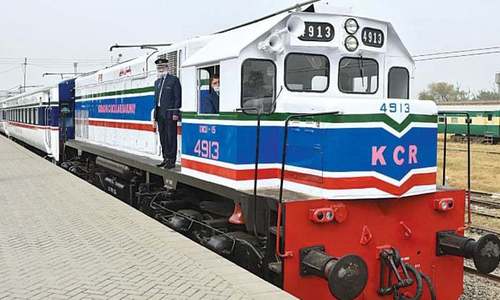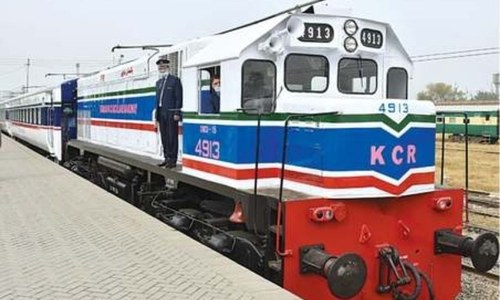KARACHI: A public hearing held on the environmental impact assessment (EIA) report of the development of Karachi Circular Railway (KCR) on Wednesday miserably failed to allay concerns of project’s affectees, who turned out in large numbers at the event where they repeatedly put their demand that the government take immediate measures for their resettlement and provide them with all basic utilities as per 2019 decision of the Supreme Court.
The event organised by Sindh Environmental Protection Agency (Sepa) was held at Karachi Cantonment Railway Station.
A federal government project — Development, operation and maintenance of Karachi Circular Railway as a modern urban railway under public-private partnership mode — is estimated to cost Rs207 billion and is envisaged to be completed in three years.
During the question-answer session, several speakers, while affirming their support to the project, regretted that there was no mention of grievances of the KCR affectees in the presentation given on the EIA report at the event.
An agreement has been signed with KE for ‘uninterrupted’ supply of electricity for running trains
Venting out their frustration over the government delaying their rehabilitation, project affectees cited the May 9, 2019 decision of a three-member bench of the Supreme Court wherein the government was directed to resettle the 1,100 people whose houses were razed in Gulshan-i-Iqbal, Quaid-i-Azam Colony, Gharibabad, Punjabi Basti, Moosa Colony and Mujahid Colony, during the anti-encroachment drive carried out to clear the KCR route.
The court, they said, had asked the government to provide them with all basic utilities in their resettlement.
“Have mercy on us! Three years have passed but not a single government official has visited us. Where should the poor go? Some of us are living on the rubble of their destroyed houses while others are forced to find residence on rent,” said an old man, who was deprived of his house in Quaid-i-Azam Colony.
It’ tough to explain how hard it was to pay monthly rent and, at the same time, manage basic necessities of life amid rising inflation, he added.
A few participants narrated their ordeal when their houses were demolished during Ramazan in 2019, describing the government’s drive to clear the route along the 43.24-km long KCR as sheer injustice.
“At that time, my wife was battling with cancer. I had to look for shelter for her and my three young daughters. And, it wasn’t just me facing this uphill task. The government had bulldozed hundreds of houses without serving any warning notice,” said another attendee, whose house was demolished seven months back, adding that the majority of the KCR affectees had been living in those localities for 50 to 60 years.
Questions over using controversial census data
About the project’s technical and legal aspects, questions were raised over the utility of sharing the EIA report with the general public at a time when the project was already in progress.
The EIA report, it was said, didn’t highlight how the project would impact people and environment and used controversial data of the 2017 census.
The information that electric trains would run on the railway track was met with wide scepticism. Concerns were also raised over the absence of Sepa’s director general and representation on behalf of the federal government at the event, indicating participants’ desire to get concrete assurances over their resettlement.
The project proponent, however, couldn’t provide with the latest data on the number of people who have so far been affected by the project.
In reply, KCR Project Director Ameer Mohammad Daudpota spoke about how the project would facilitate commuters and said 25 trains would run at a time from 6am to 11pm, transporting an estimated 475,000 riders daily.
The project would utilise the existing length of the track.
About the affectees, he said: “We are aware of your problems that exist in our record. A grievance committee is part of the project and the process of redressal would be carried out as per law.”
On concerns related to electric trains, he said an agreement had been signed with K-Electric for ‘uninterrupted electricity supplies’ under the project.
Sepa Deputy Director Imran Sabir explained that the first EIA of the KCR project was done and approved in 2008-09. Over the years, work on the project continued in bits and pieces. The department asked the railways to upgrade the EIA report following the Supreme Court’s intervention in the matter.
Earlier, a representative of the EMC Pakistan Private Limited, consultants for environmental impact assessment, gave a presentation on the EIA report, according to which the project would solve Karachi’s traffic issues and help reduce airborne contaminants.
According to the information shared during the programme, the KCR originates from Drigh Road station on the Pakistan Railways’ mainline after crossing Sharea Faisal, it passes through populated areas of Gulistan-i-Johar, Gulshan-i-Iqbal, Liaquatabad, Nazimabad, SITE, Baldia, Lyari, Kharadar, Mithadar and finally touches the City Station.
Published in Dawn, November 11th, 2021














































